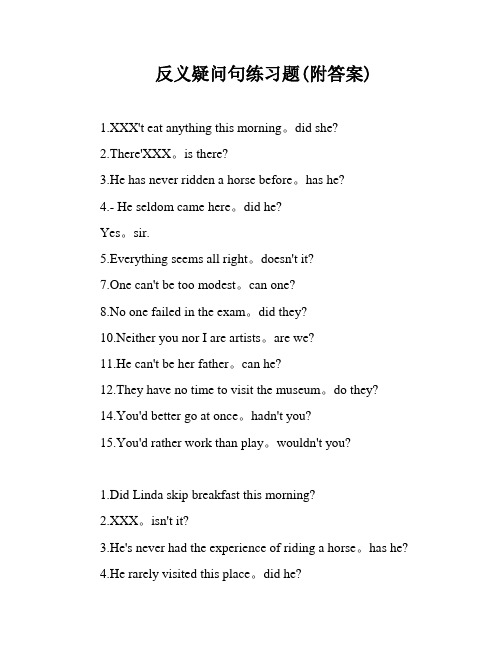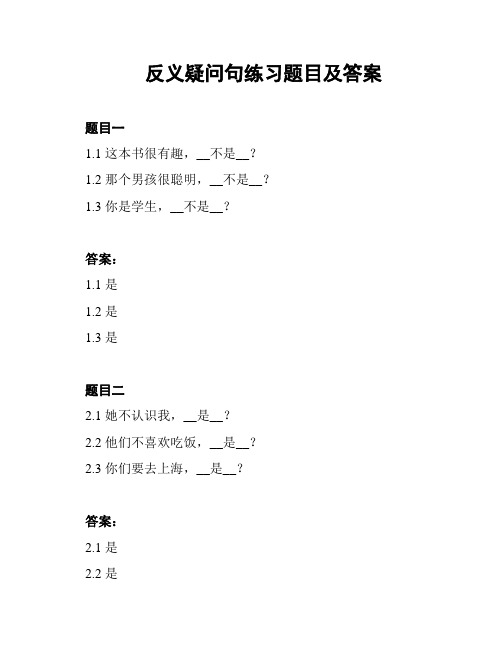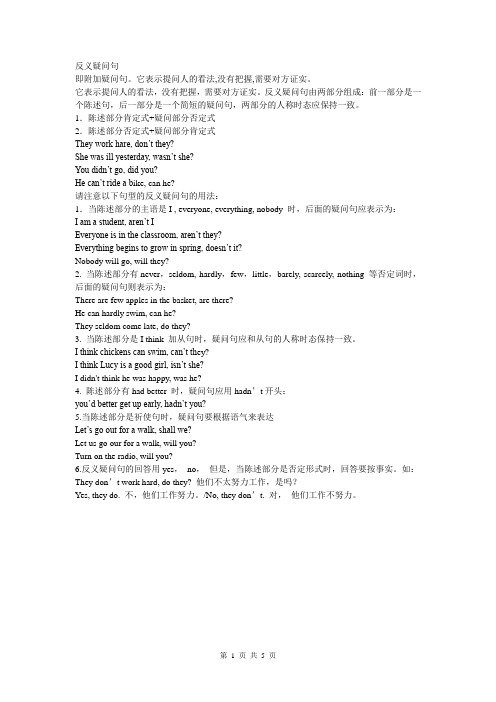反义疑问句用法及练习题(附答案)
反义疑问句的转换练习题及答案

反义疑问句的转换练习题及答案反义疑问句是英语中常见的一种问句形式,用以表示对某个陈述句的验证或确认。
学好反义疑问句的转换对于提高英语语法水平具有重要意义。
本文将提供一些反义疑问句的转换练习题及答案,帮助读者巩固和加深对反义疑问句的理解和运用。
练习题如下:1. He can swim, can't he?2. You haven't finished your homework, have you?3. She won't be here tomorrow, will she?4. They haven't seen the movie, have they?5. We should help them, shouldn't we?6. He hasn't been to Paris, has he?7. You don't like ice cream, do you?8. They could hear the music, couldn't they?9. She didn't go to the party, did she?10. He has read that book, hasn't he?答案如下:1. He can swim, can he?2. You haven't finished your homework, have you?3. She won't be here tomorrow, will she?4. They haven't seen the movie, have they?5. We should help them, shouldn't we?6. He has been to Paris, hasn't he?7. You like ice cream, don't you?8. They couldn't hear the music, could they?9. She went to the party, didn't she?10. He has read that book, hasn't he?这些练习题旨在帮助读者熟悉反义疑问句的转换规则和用法。
反义疑问句[讲义+练习+答案]
![反义疑问句[讲义+练习+答案]](https://img.taocdn.com/s3/m/bce1d8e9f705cc1755270943.png)
反义疑问句一、英文中的反意疑问句。
1、什么是反意疑问句英语中,反意疑问句是由陈述句和附在其后的附加疑问句组成。
其中附加疑问句是对陈述句所说的事实或观点提出疑问,起证实作用,一般用于证实说话者所说的事实或观点。
翻译为“是吗”2.反意疑问句的回答,回答时,如果情况属实,用Yes加上反问句的倒装肯定句;若果情况不属实,则用No加上反问句的倒装否定句。
例如You were moved by your students, weren’t you?情况属实:Yes, I were.情况不属实:No, I weren’t.二、反意疑问句中问句部分的动词与陈述部分的动词在语气上成相反的对应关系,即:肯定+否定?否定+肯定?如:①You can’t do it, can you?你不能做它,是吗?②They are very late for the meeting, aren’t they?他们开会迟到了,是吗?三.当陈述句中含有be动词,助动词,或是情态动词时,反问句部分由这些词加上主语人称代词构成,Be动词包括:am, is, are, was, were助动词有:do, does, did, have(用在完成时), has(用在完成时)等情态动词有:can, could, may, might, must, will, would, shall, should例如:She is a lovely girl, isn’t she?她是一个可爱的女孩,是吗?He will go home, __won’t__ __he__?他要回家了,是吗?She doesn’t l ike to eat popcorn, __does__ _she___?她不喜欢吃爆米花,是吗?The baby won’t sleep early, will it?小宝宝睡得不早,是吗?注意:①He has supper at home every day,doesn’t’t he? (不能用hasn’t he?)他每天在家吃晚饭,是吗?②They have known the matter, haven’t they? (不能用don’t they?)他们已经知道那事情了,是吗?四.当陈述句中只含有行为动词时,若动词加了s,就用does, 若动词为原形,就用do,动词为过去式,则用did,例如:You cleaned your house last week, _didn’t___ __you__?你上周打扫了你的房间,是吗?Your father plays the computer very well, __doesn’t__ ___he _?你父亲电脑技术很好,是吗?They look so happy today, _don’t ___ _they___?你今天看起来很高兴,是吗?五.反意疑问句的陈述部分带有little, few, never, hardly, seldom,nobody, nothing, barely, scarcely等否定意义的词时,问句部分用肯定式。
反义疑问句练习题(附答案)

反义疑问句练习题(附答案)1.XXX't eat anything this morning。
did she?2.There'XXX。
is there?3.He has never ridden a horse before。
has he?4.- He seldom came here。
did he?Yes。
sir.5.Everything seems all right。
doesn't it?7.One can't be too modest。
can one?8.No one failed in the exam。
did they?10.Neither you nor I are artists。
are we?11.He can't be her father。
can he?12.They have no time to visit the museum。
do they?14.You'd better go at once。
hadn't you?15.You'd rather work than play。
wouldn't you?1.Did Linda skip breakfast this morning?2.XXX。
isn't it?3.He's never had the experience of riding a horse。
has he?4.He rarely visited this place。
did he?5.It seems like everything is fine。
isn't it?7.It'XXX。
isn't it?8.Everyone passed the exam。
right?10.We're both not artists。
are we?11.XXX father。
反义疑问句的用法归纳及习题

反意疑问句【反意疑问句】(一)概念:反意疑问句就是由陈述句与附在其后得附加疑问句组成。
其中附加疑问句就是对陈述句所说得事实或观点提出疑问,起证实作用,一般用于证实说话者所说得事实或观点。
(二)要点注意:1.反意疑问句前后两部分谓语应就是:“肯定陈述+否定疑问”或“否定陈述+肯定疑问”。
2.简略问句如果就是否定式:not应与be,do,will等系动词、助动词、情态动词缩写。
3.简略问句得主语不用名词,应用人称代词。
4.陈述部分含“too、、、to”时,就是否定句。
(三)用法:1) 陈述部分I am时,疑问部分要用aren't I、I'm as tall as your sister,aren't I?(我与您姐姐一样高,对吗?)2) 陈述部分用no, nothing, nobody, never, few, little, seldom, rarely,hardly等否定含义得词时,疑问部分用肯定含义。
如: The old man made no answer, did he?Jim is never late for school, is he?3) 陈述部分有情态动词have to +v、(had to + v、),疑问部分常用don't +主语(didn't +主语)。
We have to get there at eight tomorrow, don't we?used to,疑问部分用didn't +主语或usedn't +主语。
He used to take pictures there, didn't he? / usedn't he?had better(最好) + v、疑问句部分用hadn't you?You'd better read it by yourself, hadn't you?4) 陈述部分有would rather(宁可、宁愿) +v、,疑问部分多用wouldn't +主语。
反义疑问句练习题目及答案

反义疑问句练习题目及答案题目一1.1 这本书很有趣,__不是__?1.2 那个男孩很聪明,__不是__?1.3 你是学生,__不是__?答案:1.1 是1.2 是1.3 是题目二2.1 她不认识我,__是__?2.2 他们不喜欢吃饭,__是__?2.3 你们要去上海,__是__?答案:2.1 是2.2 是2.3 是题目三3.1 他不喜欢看电视,__是__?3.2 你不觉得这个问题很有意思,__是__?3.3 她没去过北京,__是__?答案:3.1 是3.2 是3.3 是题目四4.1 他们不会唱歌,__是__?4.2 这是个好主意,__不是__?4.3 他喜欢看电影,__不是__?答案:4.1 是4.2 不是4.3 不是题目五5.1 她不懂汉语,__是__?5.2 你会游泳,__是__?5.3 他们喜欢吃饭,__是__?答案:5.1 是5.2 是5.3 是题目六6.1 这不是你的手机,__是__?6.2 你不喜欢这个颜色,__是__?6.3 他们会来参加聚会,__是__?答案:6.1 是6.2 是6.3 是题目七7.1 他没有听说过这个地方,__是__?7.2 你不想去旅行,__是__?7.3 她知道这个答案,__是__?答案:7.1 是7.2 是7.3 是题目八8.1 我今天晚上有时间,__不是__?8.2 他没有考试,__是__?8.3 你们都明白这个问题,__是__?答案:8.1 不是8.2 是8.3 是。
四年级英语反义疑问句练习题30题带答案

四年级英语反义疑问句练习题30题带答案1. He is a student, isn't he?答案:是。
解析:在这个反义疑问句中,前面的陈述部分“He is a student”是肯定句,根据反义疑问句的规则,肯定句后面的疑问部分要用否定形式,所以是“isn't he”。
这里be动词是is,疑问部分就将is变为否定形式isn't,然后加上主语he。
2. She is happy, isn't she?答案:是。
解析:陈述部分“She is happy”为肯定句,按照规则,反义疑问句的疑问部分要用否定形式。
be动词是is,否定形式为isn't,再加上主语she。
3. It is a cat, isn't it?答案:是。
解析:前面陈述部分“It is a cat”是肯定句,对于这种以be动词is构成的肯定句,反义疑问句的疑问部分为否定形式,即把is变为isn't,再加上主语it。
4. You are a good boy, aren't you?答案:是。
解析:陈述部分“You are a good boy”是肯定句,由于be动词是are,所以反义疑问句的疑问部分为否定形式aren't,再加上主语you。
5. They are at home, aren't they?答案:是。
解析:陈述部分“They are at home”是肯定句,be动词为are,根据反义疑问句的规则,疑问部分为否定形式aren't,再加上主语they。
6. He is my father, isn't he?答案:是。
解析:陈述部分“He is my father”为肯定句,be动词是is,反义疑问句的疑问部分为否定形式isn't,再加上主语he。
7. She is in the classroom, isn't she?答案:是。
(完整版)中考反义疑问句详解及练习和答案

即附加疑问句。
它表示提问人的看法,没有把握,需要对方证实。
它表示提问人的看法,没有把握,需要对方证实。
反义疑问句由两部分组成:前一部分是一个陈述句,后一部分是一个简短的疑问句,两部分的人称时态应保持一致。
1.陈述部分肯定式+疑问部分否定式2.陈述部分否定式+疑问部分肯定式They work hare, don’t they?She was ill yesterday, wasn’t she?You didn’t go, did you?He can’t ride a b ike, can he?请注意以下句型的反义疑问句的用法:1.当陈述部分的主语是I , everyone, everything, nobody 时,后面的疑问句应表示为:I am a student, aren’t IEveryone is in the classroom, aren’t they?Everything begins to grow in spring, doesn’t it?Nobody will go, will they?2. 当陈述部分有never,seldom, hardly,few,little,barely, scarcely, nothing 等否定词时,后面的疑问句则表示为:There are few apples in the basket, are there?He can hardly swim, can he?They seldom come late, do they?3. 当陈述部分是I think 加从句时,疑问句应和从句的人称时态保持一致。
I think chickens can swim, can’t th ey?I think Lucy is a good girl, isn’t she?I didn't think he was happy, was he?4. 陈述部分有had better 时,疑问句应用hadn’t开头:you’d better get up early, hadn’t you?5.当陈述部分是祈使句时,疑问句要根据语气来表达Let’s go out for a walk, shall we?Let us go our for a walk, will you?Turn on the radio, will you?6.反义疑问句的回答用yes,no,但是,当陈述部分是否定形式时,回答要按事实。
(完整版)反义疑问句练习题和答案讲解

反义疑问句练习1.Zhou Ming has few English magazines, ________?A.does heB.doesn’t heC.has heD.hasn’t he2.Cindy could hardly speak English three years ago, ________?A. couldn't she?B. could sheC. can she3.Alice had a wonderful time yesterday, _______?A. hadn’t sheB. wasn’t sheC. didn’t sheD. wouldn’t she 4.–She didn’t come to schoolyesterday, did she?–______, though she was not feeling well.A. No, she didn’tB. Yes, she didn’tC. No, she didD. Yes, she did5.---He hardly spent any time on his subjects, ________?---________, so he does badly in his lessons.A .didn’t he, Yes B. did he, Yes C. didn’t he, No D. did he, No 6.He’s read this book before, ?A. hasn’t heB. doesn’t heC. isn’t heD. wasn’t he 7.–Let’s go for a walk, ______?-- OK, I’m coming . Don’t forget to bring your camera, ______? A. will you; will you B. will you; shall weC. shall we; shall weD. shall we; will you8.John had a short walk after lunch, ________?A. did heB. didn't heC. had heD. hadn't he9.Nancy hardly rings you up, ___________?A. doesn’t sheB. does sheC. doesn’t NancyD. does Nancy 10.---Your brother often disagrees with you, _______ he ?--- _______. We often have different opinions.A.does; YesB. doesn’t ;YesC. does; NoD. doesn’t; No 11.Kate’s never late for school,?A.isn’t sheB.hasn’theC.is sheD.has she12.--- Liu Tao has never read the book The Adventure of Tom Sawyer , _______ he?--- _____. He told me it's very interesting. He'd like to read it again.A. is; No, he isn'tB. has; Yes, he hasC. isn’t; Yes, he isD. hasn’t; No, he hasn't13.—He’s never late for school, ________?—No, he isn’t .He is always very early.A. is heB. isn’t heC. hasn’t heD. has he 14.—There’s little meat left in the fridge, ________?—________. I’ll get some on my way home.A. is there, YesB. isn’t there, YesC. is there, NoD. isn’t there, No15.—Tom finished his homework, didn’t he?—__________, though he was ill yesterday.A. No, he didn’tB. Yes, he didC. Yes, he doesD. No, he doesn’t16.There is little water in the cup, ?A. is thereB. isn’t thereC. isn’t itD. is it17. He’s still not understood by his close friend although he has said sorryto him, _________?A. hasn’t heB. has heC. isn’t heD. is he18.You have never visited the place before, you?A. didB. didn’tC. haveD. haven’t19.Don't keep poison in the kitchen, _______?A. do youB. shall weC. will youD. don't you20.There are no museums in our city, _________?A. aren’t thereB. are thereC. is thereD. isn’t there21.Your father is playing the piano very well, he?A.isB.isn’tC.doesD.doesn’t22.—It’s her birthday tomorrow, ______ ?—Yes, let’s have a surprise party for her.A. isn’t itB. isn’t sheC. doesn’t itD. doesn’t she23.--- He’s never stolen anything before, _______ he?--- ________. It’s h is third time to be taken to the police station.A. hasn’t; YesB. has; NoC. has; YesD. is; No24.—It’s her birthday tomorrow, ______ ?—Yes, let’s have a surprise party for her.A. isn’t itB. isn’t sheC. doesn’t itD. doesn’t she25.-----Your father never watched the drama series on TV, __________? -----_____________________. He thinks theses drama series are boring and dull.A.does he; Yes, he does.B. does he; No, he doesn’tC. doesn’t he ; Yes, he does.D. doesn’t he ; No, he doesn’t .26.—Tom is an honest boy, _______ he?—Yes. We trust him all the time.A. isn’tB. isC. doesD. doesn’t27.Good, you’ve done it well! You need no more help from us, ______.?A. do youB. need youC. don’t youD. needn’t you28.His father had an important meeting just now, _______?A. did heB. had heC. didn't heD. hadn't he29.-- You used to be short, didn’t you?-- _______. I was the shortest in my class.A. Yes, I did.B. No, I didn’t.C. Yes, I was.D. No, I wasn’t.30.The farmer is wo rking now. He’s fed the horse and the sheep, _____?A. doesn’t heB. isn’t heC. wasn’t heD. hasn’t he参考答案1.A【解析】试题分析:句意为:周明几乎没有英语杂志对吗?这是一个反义疑问句,反义疑问句的结构遵循前肯定后否定或者前否定后肯定,前后人称、时态一致的原则。
- 1、下载文档前请自行甄别文档内容的完整性,平台不提供额外的编辑、内容补充、找答案等附加服务。
- 2、"仅部分预览"的文档,不可在线预览部分如存在完整性等问题,可反馈申请退款(可完整预览的文档不适用该条件!)。
- 3、如文档侵犯您的权益,请联系客服反馈,我们会尽快为您处理(人工客服工作时间:9:00-18:30)。
反义疑问句用法及练习题(附答案)反意疑问句用法及练习反意疑问句是指提出情况或者看法,询问对方同意不同意。
这种问句由两部分组成,前一部分是陈述句的形式,后一部分是附着在前一部分上的简短问句,前后两部分要构成反意疑问关系。
又分为两种情况:(1)前一部分为肯定形式,后一部分要为否定形式,即“前肯后否”的形式;或(2)前一部分为否定形式,后一部分则为肯定形式,即“前否后肯”的形式。
具体句式如下:1.0 前肯后否He is a pupil, isn’t he?You are a teacher, aren’t you?We are here, aren’t we?He likes English, doesn’t he?You like English, don’t you?They like English, don’t they?We shall go to the cinema, shan’t we?2.0 前否后肯He isn’t a pupil, is he?You aren’t a teacher, are you?They won’t go to the park tomorrow, will they?I am not a teacher, am I?You haven’t done your homework, have you?3.0陈述部分主、谓语是I am…时,3.1陈述句为肯定句时,反意疑问句用aren't I 或ain't I, 而不是am not I (可用am I not),例如:I'm as tall as your sister, aren't I?I am a doctor, aren’t I?或I am a doctor, ain't I? (慎用)反意问句为否定式时通常要缩写(若不缩写则用较正式的am I not),而am not在标准英语中又没有相应的缩写式,所以人们便用aren’t 来代之。
原来,aren’t I 是由 am not I 的缩写形式amn’t I 演变来的。
而这种演变的原因,就是发音的便利。
英国人讨厌两个鼻辅音[m] 和[n] 放在一起发音。
当这两个音在amn’t I 中撞到一起时,就必须进行简化,只保留其一。
英国人感觉[a:nt] 比[a:mt] 要顺口一些。
所以在 18 世纪的文献里开始出现an’t。
元音 [a:]的发音长短有变,有时长,有时短,由于aren’t中元音后的 r 在 18世纪左右是不发音的,所以amn’t的简化发音an’t和aren’t的发音自然就没有区别了。
18 世纪以后,曾经流行的an’t I 渐渐被aren’t I 取代。
今天在爱尔兰和苏格兰的某些方言中仍可听到amn’t。
aren’t I 在美国也被广泛使用。
有些美国人不喜欢,感觉它有点装腔作势,认为还是am not I 更正式。
但aren’t I无论在口语还是书面语中都已被英语世界的大多数人接受。
但是值得注意的是aren’t只适用于单数第一人称的问句形式(不能用于陈述句):正:I’m wrong,aren’t I? 我错了,是吗?正:Aren’t I clever? 我是不是很聪明?误:I aren’t clever. (我不聪明)正:I’m not clever. 我不聪明。
在英语的方言和未受过教育的人使用的语言中,还有一个缩写式用得很经常,就是ain’t,它可以代表amnot, are not, is not, has not, have not等(考试时应避免),例如:I ain’t going to tell you about it. 我不准备把此事告诉你。
My girlfriend ain’t come for weeks. 我的女朋友有好几个星期没有来了。
Don’t speak to me like that - you ain’t my boss. 不要那样对我说话,你又不是我的老板。
- It’s raining. 下雨了。
- No, it ain’t. 没有下。
3.2 陈述句为否定句时,即I am not…., 反意疑问句用am I? 例如:I am not a fool, am I?4.0 省去主语的祈使句后一般加上will you或won't you构成反意疑问句,用will you 多表示“请求”,用won't you 多表示提醒对方注意,例如:Look at the blackboard, will you/won't you? 看黑板,好吗?Don't do that again, will you?Go with me, will you / won't you ?5.0 Let引导的祈使句,有两种情况:5.1 Let's…,(包括听话者)后的反意疑问句,表示“建议”,用shall we或shan't we。
例如:Let's go home, shall we/shan't we? 回家吧,好吗?Let's go to the station, shall we?(Let's 包括听话者,所以用shall we?)还可以用may I来表示征求对方的同意或许可。
5.2 Let us…,(不包括听话者)后的反意疑问句,表示“请求”,用will you 或won’t you. 例如:Let us go for a walk, will you?/won't you?(Let us 不包括听话者,而是向听话者提出建议或要求。
)5.3 Let me…后的反意疑问句用,表示“请求”,will you或won't you.例如:Let me have a try, will you/won't you? 让我试一试,行吗?Let me help you, will you?5.4 Let him…, Let them…, Let the boy…用will you或won't you.6.0陈述句对第二人称的祈使句,问句可用will you? Won't you? Would you? Can you? 或can't you?)Open your books, would you/won't you?Don't make much noise, will/can you?7.0 否定祈使句中, 只用will you?Don't forget to write a letter to me, will you?8.0 宾语从句中,谓语动词是think、suppose、expect、believe、consider、imagine等词8.1 宾语从句的主语是第一人称,表示肯定时,则疑问句中的助动词和主语要与从句内的动词和主语保持一致,疑问句为否定句式。
例如:I believe that you can fly, can't you?We think that he has a cellphone, doesn't he?We think that he has done his best, hasn't he?注意:容易出错的地方是第二句和第三句,很多人把第二句的改成hasn't he,把第三句改成doesn't he,这两种情况都是因为没有分清楚从句中的动词是哪个,比如第二句话,其中的has是拥有的意思而不是助动词,此句中的助动词应该是does,而第三句话中这个has 应该和has done连起来理解,它们是用来表示完成时态的一个助动词,而不能用does来代替哦,这两个一定要分清楚哦!8.2 宾语从句的主语是第一人称,表示否定时(转移否定),疑问句中的助动词和主语依然要与从句内的动词和主语保持一致,疑问句为肯定句式。
例如:I don't believe that you can fly,can you?We don't think that he has a cellphone, does he?We don't think that he has done his best. has he?注意:容易混淆的地方是宾语从句的否定是在主句中否定的,而不是从句中,例如第一句话,不能写成I believe that you can't fly.8.3 宾语从句的主语不是第一人称时,疑问句中的助动词和主语要与宾语从句主句内的动词和主语保持一致。
例如:They think that he can fly, don't they?She doesn't think that he has a cellphone, does she?8.4 宾语从句中,谓语动词不是think、suppose、expect、believe、consider、imagine等词时无论主句主语是不是第一人称,疑问句中的谓语和宾语都要与主句保持一致。
例如:We told him we would go there next week, didn't we?He said that Lily would come back next Monday, didn't he?9.0陈述部分有must 的疑问句,疑问部分根据实际情况而定。
9.1 must表示"必须"、"有必要",用must或need, 例如:He must work hard at physics,mustn’t he?We must study all the subjects well, needn't we?9.2 must be/do表示对现在的情况进行推测时,要用be/do 的适当形,例如:It must be Xiao Wang, isn't it?He must be a doctor, isn't he?9.3当must have done完成式表示对过去事情的推测时,问句要根据陈述部分谓语的情况用“didn't+主语”或“wasn't/weren't+主语”;如果强调动作的完成(一般没有明确的过去时间状语),问句要用“haven't/hasn't+主语”,例如:You must have studied English for three years, haven't you? / didn't you?She must have read the novel last week, didn't she? 她上星期一定读了这本小说,是吗?He must have finished it yesterday, didn't he?You must have seen the film "Shaolin Brothers", haven't you?You must have told her about it, haven't you? 你一定把这事告诉她了,是吗?9.4当must表示"禁止"时,反意问句要用may,例如:The boys mustn't play with fire, may they?10.0当陈述句含有used to时,简略问句用did,也可重复used,例如:He used to get up early, didn't he/ usedn't he?11.0陈述部分的谓语含有dare, need时,看它们是情态动词还是行为动词11.1当dare, need为情态动词时,反意疑问句用,dare、need,The girl daren't go home alone, dare she?We need not do it again, need we?You dare not say so, dare you?11.2当dare, need 为实义动词时,疑问部分用助动词do,例如:She doesn't dare to go home alone, does she?He needs help, doesn't he? (need在此句中为实义动词,“需要“的意思)12.0陈述部分的谓语包含have to, has to, had to时,疑问部分要用助动词(do)的适当形式,例如:You had to do it well, didn't you?You have to water the vegetables every day, don't you?13.0陈述部分有had better时,反意疑问句中要用hadn't。
